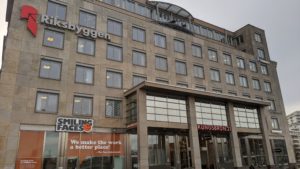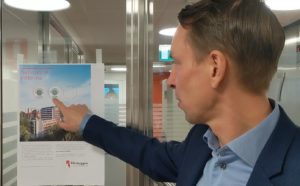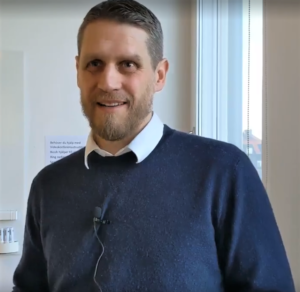Swedish Cooperatives
CHI’s Secretary-General, Julie LaPalme, was in Stockholm, Sweden, in February 2020 where she met with two of CHI’s largest members, HSB and Riksbyggen. Both are large cooperatives offering cooperative homes for sale and for rent along with construction, development and management services throughout Sweden. Both cooperatives prioritize environmental sustainability and their efforts are paying off as they have both been named Most Sustainable Company in Sweden for two consecutive years.

How do these two Swedish cooperatives go about delivering on their sustainability commitments?
First of all, Riksbyggen’s sustainable development department includes an energy strategist, an environmental manager, a sustainability manager and sustainability specialists. They build with climate-enhanced concrete, install solar panels, are phasing out harmful chemicals and are investing in a fossil-free car fleet. They even install birdhouses and insect hotels to promote small-life wildlife and biodiversity!
In 2018, Riksbyggen developed a new strategic direction for 2019-2021, which includes reaching the UN’s SDGs, not an easy task considering that the construction and real estate sectors account for about 10–40 percent of all environmental impact in Sweden. This commitment has led to Riksbyggen to collaborate with researchers, the business community, the City of Gothenburg and dedicated residents to develop the concept of Positive Footprint Housing, a new way to build and manage housing that is good for people, the environment and the economy. This means working to satisfy human needs without compromising the ability of future generations to meet their needs.

One of Riksbyggen’s recent developments, Brf Viva in Gothenburg, qualifies as Positive Footprint Housing. The cooperative used a new type of concrete with a significantly lower climatic impact (30% less C02 emissions). It also introduced mobility apps for car and bike sharing, smart waste systems and are repurposing old bus batteries for solar energy storage. It’s no wonder Riksbyggen has won the Environment Building of the Year for two consecutive years at Sweden’s Green Building Awards.
Riksbyggen is also concerned about providing young people with opportunities to find homes by trying new models to lower thresholds for entering the housing market. Diversity and inclusion are also things they are improving. For example, one of their goals is to recruit more managers who are women to bring them over the 40 percent mark.

Christian Bengtzelius, Head of Owner Relations, Riksbyggen
The second Swedish cooperative we are featuring is HSB, another cooperative housing organization that takes sustainability seriously. In 2016 HSB adopted a strategy for sustainable growth consisting of four overarching goals: resource efficiency, climate, sustainable services and products, and being an important community actor. They also support the UN’s SDGs number 5 and number 7 to 13 and contribute to three of the sixteen Swedish environmental quality goals under the categories of good built environment, limited climate impact and non-toxic environment.

Magnus Ulaner, HSB’s Environmental Director (pictured on the right), states that the SDGs have been quite well received in Sweden. Both the business community and the government have jumped on this opportunity and have integrated the SDGs in their communications and overall strategy and HSB is no exception.
The SDGs are well integrated into HSB’s communications strategy and in its operations. They share their many achievements and innovations in environmental sustainability in their quarterly magazine and on their social media channels. HSB also reports on their progress on a yearly basis via the UN’s Global Compact website, the world’s largest corporate sustainability initiative that calls for companies to align their strategies and operations with universal principles on human rights, labour, environment and anti-corruption, and take actions that advance societal goals.
In terms of human rights, HSB is working with approximately 130 different suppliers and is placing clear demands on quality, environmental and social responsibility assurance with its partners. Every three years HSB’s suppliers must reveal how they work with the environment, human rights, working conditions and anti-corruption and then work together with HSB to make any necessary changes.

Living Lab in Gothenburg, Sweden
One of HSB’s biggest and most famous sustainable innovations is a ten-year project called Living Lab. It is a shared house where students from Chalmers University of Technology in Gothenburg have their own rooms but share a kitchen and other common areas. Two thousand sensors measure energy and water consumption, air pressure, C02 and many other measures, creating expansive research possibilities that feed into improved construction practices.

Gabriel from Hamnkaptenen HSB Coop
CHI is proud to have such sustainably-minded cooperatives as its members and we hope that by sharing their achievements we can inspire others to follow in their footsteps. Sweden has a long history of focusing on the environment, including our trailblazing Swedish cooperators. Stay tuned for more good practices in sustainability from other CHI members in the near future.
We invite you to visit the Swedish section of our Cooperatives Worldwide web page to find a more in-depth description of key characteristics of housing cooperatives, history, legal framework, financing and more in Sweden.

